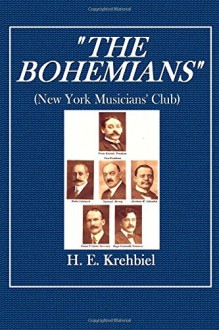From the beginning of the first chapter: THE problem which vexed the mind of Faust, pondering the philosophy formulated at the outset of The Gospel according to St. John, is solved so far as the genesis of The Bohemians is concerned by an acceptance of all the theories which Goethe's philosopher...
show more
From the beginning of the first chapter: THE problem which vexed the mind of Faust, pondering the philosophy formulated at the outset of The Gospel according to St. John, is solved so far as the genesis of The Bohemians is concerned by an acceptance of all the theories which Goethe's philosopher propounded. "In the Beginning was Rafael Joseffy. "—Thus we write. He was at once Word, Thought, Power and Deed. It was Joseffy who conceived the Club, Joseffy who suggested it to his friends, Joseffy who had the puissant force to mould them into agents of his will and thus called The Bohemians into being—called the Club into being and at once planted it in fruitful ground. It was the adoption of his spirit of good-fellowship, helpfulness, unselfish aims, mutual respect among artists, hatred of petty jealousy and devotion to manly social and artistic ideals which gave the Club its firm foundation. It has been by keeping the salient and admirable traits of his character in mind as a guide that the Club has achieved a growth, stability and usefulness which make it unique among organizations of its kind. It will be by keeping in the path illuminated by his character as man and musician that The Bohemians shall remain the active and forceful factor which it now is in the artistic life of New York and the world of music at large. Let us therefore for a moment bring back the man to our mental vision. The most striking and amiable trait in the character of Rafael Joseffy was his lack of envy or jealousy and his unfailing courtesy and kindness towards his colleagues. And this no less in the heyday of his popularity as a virtuoso than after his retirement from the concert-stage in the plentitude of his powers and the zenith of his fame. During the decade from 1880 to 1890 he had no real rival among the pianists who gave concerts in New York, either resident or visiting. His popularity burned ever with a steady and lambent flame, no matter how much enthusiasm was kindled by newcomers. All of these he met in a spirit of unselfish, unenvious, ungrudging sympathy. For every one he had a prompt and cordial greeting. When a new candidate for public favor appeared he was always first in the artists' room to offer his felicitations and wishes for success. To everyone he brought a message of cheer and encouragement. It sometimes happened that he met with a rebuff from a boor or an eccentric; but the treatment never awakened resentment in his soul. Down to the day of his death he continued to admire everything admirable in visiting virtuosos and maintained unsullied his amiable attitude towards all his confrérés. It was at a social gathering which illustrated this trait in Joseffy's character that The Bohemians was conceived. He sat with some friends at Lüchow's to speed a parting guest as he had welcomed his coming. Moriz Rosenthal had completed a concert tour of the United States and was about to return to his European home. Amongst those who had gathered with Joseffy to bid farewell to the distinguished artist were Rubin Goldmark, August Fraemcke, Hugo Grunwald and Sigmund Herzog. Familiar names these, for they appear on every page of Bohemian history written in word and deed from that day to this. There had been clubs of musicians in New York before, there were such clubs then, but they all lacked the spark of vitality. Joseffy proposed a new organization and outlined what should be the scope, the aims and the means of its activities; good-fellowship, camaraderie were to be promoted, the too common feelings of envy and jealousy frowned on, the art and its practitioners, lofty and lowly, encouraged…
show less

